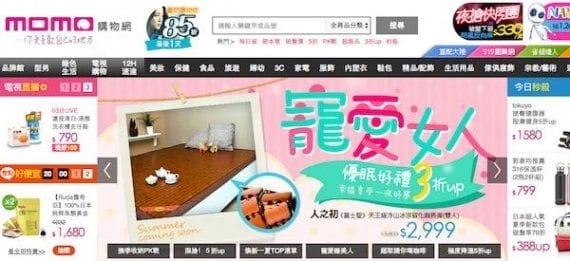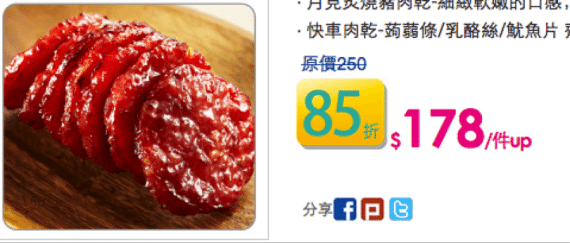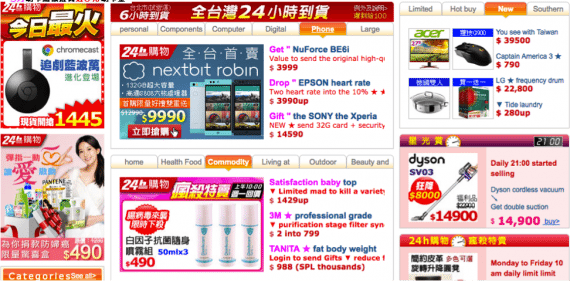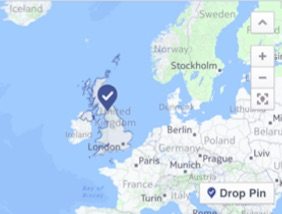
Ecommerce is booming in Taiwan. Roughly 70 percent of online shoppers buy from their smartphones. Momoshop, for example, sells broad-based consumer goods. It is one of top three ecommerce sites in Taiwan.
Taiwan might be a small island but it is big on ecommerce. Taiwan is among the world leaders in terms of ecommerce penetration — the percentage of residents that have purchased products online. Roughly 62 percent of residents in Taiwan have purchased online, according to published reports. This compares to 77 percent for the U.K., the world leader in terms of ecommerce penetration. The U.S. comes in at 66 percent.
Ecommerce now holds an 11-percent share in the Taiwan’s total retail sales.
This is the fourth installment in a series wherein I review the ecommerce market in countries and regions around the world — following “Ecommerce in Japan: Marketplaces Dominate,” “Ecommerce in South Korea: Aggressive Discounting, Rewards,” and “Ecommerce in Australia: Cross-border Shopping Common.”
The three largest ecommerce sites in Taiwan sell broad-based consumer goods. The sites are PCHome, Momoshop, and Rakuten Ichiba Taiwan. PChome and Momoshop are local sites that sell directly to consumers — they are not marketplaces — without the backing of large international players. Rakuten Ichiba Taiwan, a marketplace, is owned by Rakuten, Inc., the Japan-based Internet conglomerate.
Social Networking Key
Ecommerce sites in Taiwan utilize popular social networks to drive traffic. Product pages are typically linked to social networks to enable sharing. Taiwanese shoppers heavily use Facebook, Twitter, and Plurk, a Taiwanese network. (Plurk, incidentally, is number 76 in “91 Leading Social Networks Worldwide,” my article from last year.)

PChome lists social sharing icons from Facebook, Plurk, and Twitter on its product pages.
Loyalty Points Reward Customers
Ecommerce sites in Taiwan often use loyalty points to reward shoppers, who can redeem the points for gifts or for payment of any product.
For example, customers on Rakuten Ichiba Taiwan that pay with the Rakuten credit card get two percent back in Rakuten loyalty points, which can then be redeemed for any purchase.

Customers on Rakuten Ichiba Taiwan that pay with the Rakuten credit card get two percent back in Rakuten loyalty points.
High Density Websites
Ecommerce web design in Taiwan is similar to Japan, with highly dense pages that contain much content.

PChome Online is a high-density site with much content on every page. This type of design is popular among ecommerce sites in Taiwan.
Gaming Is Top Product Category
A whopping 31 percent of Taiwanese consumers have purchased games online. This makes gaming as the top product purchased online, followed by mobile apps (24 percent), discount coupons (23 percent), clothing and accessories (22.7 percent), and personal, skincare, and cosmetics products (14.7 percent).
International brands like Gap (the American fashion retailer) and Zara (a fashion retailer from Spain) have launched online stores in Taiwan, highlighting the popularity of ecommerce in that country.
Cross Border Ecommerce Popular
Taiwan’s geographical proximity to China and Japan has led to increased cross border ecommerce, where Taiwanese shoppers buy from Chinese and Japanese sites, and vice versa. Taiwanese products are considered high quality in Japan and China.
As an example, Yahoo Hong Kong recently announced the launch of its Yahoo Hong Kong-Taiwan cross-border ecommerce platform. Via the platform, the first group of more than 100 Taiwan-based brands accredited by the Made in Taiwan designation (as recognized by Taiwan’s Ministry of Economic Affairs), in categories ranging from food to fashion and to beauty and cosmetics, will enter Hong Kong market.
This is the first step for Yahoo Hong Kong to create the cross-border ecommerce network. As its next step, the company will bring Hong Kong’s most popular products to Taiwan.
Heavy Mobile Users
Taiwan’s robust online infrastructure has catapulted the country to rank among the top of Asia Pacific’s mobile commerce users. More than 70 percent of the Taiwan’s online shoppers reportedly use their mobile phones to buy products and services.
Taiwan’s consumers also heavily use showrooming — the process of comparing prices on a smartphone while in a brick-and-mortar store — as the overall Taiwan retail environment is very price competitive.
Multiple Payment Options
Most ecommerce sites support credit cards, credit card installment payments, cash on delivery, bank transfer, and ibon, a payment service in local 7-Eleven stores. (Customers obtain a transaction number after completing an online order. They use that number to print a payment slip via an ibon kiosk, and then pay at the counter at 7-Eleven stores.)
Convenience store payments are popular in Taiwan. There are more than 5,000 7-Eleven stores in Taiwan and more than 10,000 convenience stores overall.
Entering the Taiwan Market
Retailers and distributors entering the Taiwan market often utilize, initially, partnerships with local ecommerce businesses. After a trial, they can decide to invest more, with their own ecommerce presence. This is what Gap and Zara, mentioned previously, have done, as examples.
See the next installment in Gagan Mehra’s ecommerce-around-the-world series, at “Ecommerce in India: Marketplaces, Cash on Delivery Dominate.”




